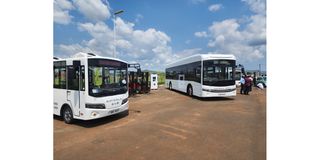Tanzania set to gain from Uganda’s groundbreaking electric bus plant

What you need to know:
- Tanzania is well-positioned to capitalise on the opportunity presented by East Africa's first electric vehicle manufacturing plant in Uganda, as the country has a reliable power supply, and abundant deposits of iron, coal, and strategic minerals.
Jinja. Tanzania is well-positioned to capitalise on the opportunity presented by East Africa's first electric vehicle manufacturing plant in Uganda, as the country has a reliable power supply, and abundant deposits of iron, coal, and strategic minerals.
At the end of the year, Uganda is expected to launch its electric bus manufacturing plant, the first of its kind in East Africa.
The milestone has been globally lauded due to its significant reduction of carbon emissions, which adversely contribute to climate change, and the region’s transition to clean energy.
The world targets zero carbon emissions by 2050 by implementing different initiatives, including technological investment in the manufacture of electric vehicles.
Kiira Motors Corporation (KMC), a government entity based in Jinja, manufacture electric vehicles, believing that Tanzania has significant potential to benefit from its different aspects of the value chain due to power reliability and abundant resources such as iron, coal, and critical minerals.
Tanzania’s potential has increased after the Julius Nyerere Hydropower Project (JNHPP) commenced operations and the abundant mineral deposits that could provide strategic minerals such as nickel, copper, and cobalt, among others.
Strategic minerals are essential for manufacturing electric vehicle batteries, which KMC currently imports from China.

"We are the first in Africa to establish a factory manufacturing electric vehicles, providing an opportunity for all African countries to supply raw materials to us,” the KMC chief executive officer, Mr Paul Musasizi, told a delegation of visiting Tanzanian journalists and the transport sector stakeholders on Thursday, August 15, 2024.
The delegation visited the factory, where they had an opportunity to learn about the factory’s operations and concluded that the state of the art was typical African and not Ugandan.
He said Uganda had been spending over $2 billion (Sh5.42 trillion) on fuel imports, expressing hope, however, that the domestic manufacture of electric vehicles was being expected to reduce imports.
Mr Musasizi added that the e-mobility expo, which gathers transport sector stakeholders, policymakers, and investors, was taking place on Friday, August 16, 2024, would be an opportunity for the delegation to view the vehicles and grab investment opportunities.
“The factory has so far made over 40 vehicles being used as upcountry and commuter buses. They are operating in Kampala, Entebbe, and Jinja as we expand the manufacturing capabilities,” he said.
He said $85 million, equivalent to Sh230.35 billion, had been invested since 2007, when the factory’s development plans commenced.
Initially, vehicles were manufactured in a small facility in Kampala; subsequently, a larger factory was established to increase production volume.
Mr Musasizi said the factory had been manufacturing 250 vehicles a month, about 3,000 annually, noting that plans had been to attain 5,000 annual production.
"We faced many challenges at the beginning, making it difficult for us to continue the project execution. However, over time people will understand that these vehicles play a significant role in reducing emissions and creating a friendly environment for citizens,” he said.
The Tanzania Bus Owners Association (Taboa) secretary, Mr Priscus Joseph, said Uganda was revolutionising the transportation sector, explaining that they were set to reduce transportation costs and the country significantly benefiting from it.
He said the amount spent on oil imports would significantly decrease, hence addressing the ongoing foreign currency challenge, especially the US Dollar shortage.
“This plant is a great opportunity for the EAC countries and the continent at large,” he said, saying that Tanzania had been importing 450 million litres of fuel every month, requiring a huge amount of US dollars for that.
"It is a good thing for Africa; it will greatly reduce production costs so that we can go along with the ongoing Standard Gauge Railway (SGR) investment that has started impacting the country’s transportation sector,” he added.





